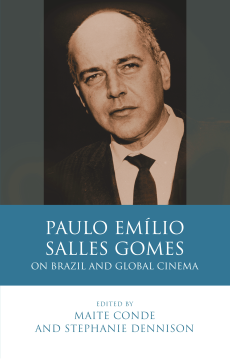
Additional Information
Book Details
Abstract
Paulo Emílio Salles Gomes (1916–77) is revered in Brazil as the first ardent defender, promoter and theorist of Brazilian cinema. A film professor, critic and historian, his dedication to cinema shaped a generation of influential film critics in his home country, and set the foundations for the serious study of film in Brazil. For the first time in English, this book brings together a selection of his essays for an English-speaking audience, with detailed explanatory introductions to each section for readers unfamiliar with the context of the writings of Salles Gomes.
By blending together ruminations on global and national cinema, as well as avant-garde film and popular movies, the collection shows how the defence and promotion of a national cinema has been forged through dialogues with international trends, informed by commercial influences, and shaped by global and national political contexts. The book thus introduces readers to the international dimensions of Salles Gomes’s engagements with film, and in doing so reassesses the locatedness of his formulations on national cinema and signals their international dimensions.
Table of Contents
| Section Title | Page | Action | Price |
|---|---|---|---|
| Cover Page | Front Cover | ||
| Half-title Page | i | ||
| Series Editors | ii | ||
| Title Page | iii | ||
| Copyright Page | iv | ||
| Contents | v | ||
| Series Editors’ Foreword | ix | ||
| Acknowledgements | xi | ||
| List of Sources | xiii | ||
| List of Illustrations | xv | ||
| Preface | xvii | ||
| Foreword | xix | ||
| Introductory Essay: Paulo Emílio Salles Gomes, Cinema and Cinephilia | xxvii | ||
| Part I: Social and Cinematic Engagements | 1 | ||
| Introduction | 3 | ||
| Declaration | 10 | ||
| Commentary | 13 | ||
| A Time of Pessimism | 17 | ||
| Platform for a New Generation | 21 | ||
| Start of a Conversation | 33 | ||
| A Century of Film | 35 | ||
| Unnecessary Intellect | 41 | ||
| Part II: Foreign Dialogues | 45 | ||
| Introduction | 47 | ||
| On Hollywood | 56 | ||
| The Long Voyage Home | 56 | ||
| Against Fantasia | 66 | ||
| Citizen Kane | 72 | ||
| Orson Welles: The Brazilian Adventure | 81 | ||
| Hitchcock’s Mutations | 85 | ||
| Independence and Money | 89 | ||
| Is Chaplin Cinema? | 93 | ||
| Mythology and Truth | 100 | ||
| On Soviet and European Cinema | 104 | ||
| Jean Vigo: Zéro de Conduite | 104 | ||
| Eisenstein’s Thinking | 108 | ||
| The Other Side of Jean Renoir | 112 | ||
| The Ideology of Metropolis | 116 | ||
| A Religious Adventure | 121 | ||
| The Critic André Bazin | 126 | ||
| Battleship Potemkin and October | 131 | ||
| Cinema and Prostitution | 137 | ||
| Revolution, Cinema and Love | 141 | ||
| Part III: National Cinema | 147 | ||
| Introduction | 149 | ||
| On Brazilian Cinema | 158 | ||
| Mauro and Two Other Great Directors | 158 | ||
| The Good and the Bad in Khouri | 165 | ||
| Compensated Nudity | 167 | ||
| A Healthy Orgy | 170 | ||
| On the Banks of Ipiranga | 173 | ||
| The Secret of the Man Critics Never Praised: Mazzaropi | 176 | ||
| The Three Gunslingers | 180 | ||
| Glauber | 182 | ||
| For a National Cinema | 184 | ||
| Paulo Emílio: A Brazilian Film Critic | 184 | ||
| A Colonial Situation? | 186 | ||
| Cinema: A Trajectory within Underdevelopment | 192 | ||
| The Social Expression of Documentary Films in Silent Brazilian Cinema | 208 | ||
| Exhibitors | 214 | ||
| The Cinematheque and Obstinacy | 216 | ||
| The Latin American Situation | 220 | ||
| Bibliography | 224 | ||
| Filmography | 227 | ||
| Index | 231 | ||
| Back Cover | Backcover |
